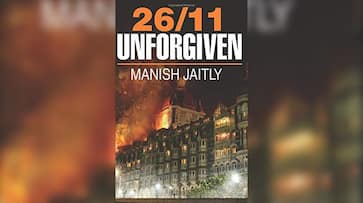Author Manish Jaitly keeps the broader facts like Pakistan’s involvement in the 26/11 attacks, Hafiz Saeed, Ajmal Kasab, India’s reaction etc intact but weaves a fictionalised story of retribution around the narrative
It’s a story of rage, retribution, justice and, more than that, the torment of a commoner who yearns for vengeance for his personal loss — it’s a chance for every Indian to live that vicarious dream he must have fantasised about at some point or the other when the government, its elected representatives, a few fellow Indians, and all other possible institutions failed him.
The story is a fictionalised account of what happened during and after the 26/11 terror attacks in Mumbai. The broader facts like Pakistan’s involvement in the attacks, Hafiz Saeed, Ajmal Kasab, India’s reaction etc. have all been kept intact but a fictionalised story is woven around the narrative that all of us know of.
Vikram Maheshwari, the protagonist, is a successful entrepreneur and son of a military veteran of the 1971 India-Pakistan War. He happens to be with his wife and their only daughter in the famous Taj Hotel on the fateful night of November 26, 2008. A bunch of terrorists from Pakistan launch carries out attacks with impunity at multiple places of Mumbai and take the city hostage. They kill Vikram’s wife and daughter while Vikram himself has a narrow escape.
Vikram’s whole world comes crashing down; the only two people he loved the most have been killed in cold blood for no mistake of theirs. He hopes the government would avenge the loss of more than 170 of its people. Any strong and proud nation would seek revenge, not mere justice – as per Vikram. But the lily-livered actions of the government of the day boggles him, disturbs him. The candle marches by the peace brigade, the ‘spirit of Mumbai’, the romanticising of being victims, and the whole city going about its business as usual, makes his blood boil.
Vikram refuses to be the victim and decides to take charge of things. He is doubly convinced that trusting the government to pay back Pakistan in its own coin is futile. He teams up with his former employee Farzana and her terrorist brother Zakir who has links with a prominent Islamic terrorist organisation of India. Through Zakir, he learns who the masterminds behind the 26/11 attacks are and makes a detailed plan to kill them.
ACP Ajay Dixit comes to know of Vikram’s plans to kill the mastermind of 26/11 attacks, who also happens to be the high commissioner of Pakistan! This leads to a cat-and-mouse game between ACP Dixit and Vikram. Whether or not Vikram becomes successful in his mission, and what happens to Farzana and Zakir make the rest of the story.
Manish Jaitly, who also happens to be a former military officer, has produced a gripping story in the shape of 26/11 Unforgiven. His contempt for the campaigns like “Aman ki Asha”, the bizarre theory and the then government’s tacit support to linking of the Mumbai attacks with RSS and the laxity in government response have been pronounced in the attitude of the protagonist, Vikram Maheshwari.
The book excels in weaving a gripping tale with a fast pace but may lack in the in-depth development of important characters of the narrative. However, as mentioned before, the reader gets the vicarious sense of justice, which seems so elusive in the real world, where the state is filled with a multitude of pusillanimous men masquerading as pacifists.
About the book
Title: 26/11 Unforgiven
Author: Manish Jaitly
Publisher: Indica
Price: Kindle edition Rs 123.90, Paperback Rs 280.00
Brief Bio
The writer holds a bachelor's degree in Electronics and Instrumentation engineering and a master's degree in Business Administration majoring in Finance and Marketing. Dhruva currently works as a senior financial analyst for State Street Global Advisors, a renowned asset management company. His major interests are in history, philosophy, literature, art, politics, and religion. He blogs at http://themeindia.blogspot.in.
Last Updated Feb 11, 2019, 3:46 PM IST









![Salman Khan sets stage on fire for Anant Ambani, Radhika Merchant pre-wedding festivities [WATCH] ATG](https://static-gi.asianetnews.com/images/01hr1hh8y86gvb4kbqgnyhc0w0/whatsapp-image-2024-03-03-at-12-24-37-pm_100x60xt.jpg)
![Pregnant Deepika Padukone dances with Ranveer Singh at Anant Ambani, Radhika Merchant pre-wedding bash [WATCH] ATG](https://static-gi.asianetnews.com/images/01hr1ffyd3nzqzgm6ba0k87vr8/whatsapp-image-2024-03-03-at-11-45-35-am_100x60xt.jpg)


